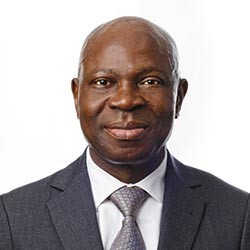Gender Awards 2021 - Statement by Gilbert Houngbo, IFAD President
IFAD Asset Request Portlet
Agrégateur de contenus
Gender Awards 2021 - Statement by Gilbert Houngbo, IFAD President
15 octobre 2021Today, on the International Day of Rural Women, I’m delighted to welcome you to the 2021 Gender Awards.
Since 2013, the Gender Awards have recognized IFAD-supported projects that address gender inequalities and empower women in innovative, transformative ways. This year’s awards celebrate the achievements of real changemakers from Kenya, Nicaragua, Nigeria, Philippines and Tunisia.
As we well know, empowering rural women is central to IFAD’s work. Rural women and girls, including indigenous women, are major contributors to the rural communities where we work. They make up a significant proportion of food producers. And they are central to providing water, fuel and care. These are key resources for good nutrition and food security. Rural women are also positive agents of change who contribute to the well-being of their families and communities.
Thus it’s fitting to present the IFAD Gender Awards on October 15, the same day we celebrate the International Day of Rural Women – and the social, economic, and political progress made by the 1.7 billion women and girls who live in rural areas.
As we celebrate, however, we also call attention to the continued discrimination, marginalization and oppression that rural women face.
Gender inequality limits women’s access to resources and opportunities. It reduces their autonomy and their ability to make decisions about their lives. As a consequence, their full potential as agents of positive change is too often unrealized.
Women play a critical role in food systems across the world, in particular in low and middle income countries. As we begin to implement the outcomes of the Food Systems Summit, we must remember that an inclusive transformation of food systems is necessarily one that empowers and creates opportunities for women. At IFAD, we have seen time and again that when women are the centre of change, sustainable and inclusive transformation is possible.
These barriers inhibit rural women’s livelihoods, and have a negative impact on families.
For example, a recent study in five sub-Saharan countries found that closing the gender gap in agricultural productivity could increase crop production by an estimated 7 to 19 per cent. In economies where gender equality is greater, in terms of both opportunities and beneits, there is higher economic growth and a better quality of life.
Supporting rural women is especially important in light of the global climate crisis, which is having a disporpionate impact on women and girls. In our projects, enabling rural communities to adapt to climate change is a major focus -- and we know we can only do this effectively by building the resilience of women and girls, and ensuring solutions are informed by their knowledge and perspectives.
Given the significant role women play in food production and processing with the right support and training, they could help build food systems that are more resilient to the impacts of a changing climate. This is an issue IFAD will be highlighting – along with our partners -- at the upcoming COP26 in Glasgow..
In recognition of the importance of rural women to the development agenda, IFAD invests in gender transformative interventions. Gender transformation means going beyond the symptoms of gender inequality to tackle the root norms, attitudes and behaviours in order to generate sustainable, effective and long-term changes.
Gender transformation works toward long-term changes in cultural norms and practices, as well as in laws and policies, in order to break stereotypical gender roles and practices.
To be gender transformative, interventions need to address women’s day-to-day needs by improving their technical knowledge and skills. Interventions must also facilitate women’s decision-making roles and access to assets by changing the formal and informal social structures that reinforce gender inequalities.
The projects recognized by this year’s Gender Awards provide concrete evidence that it is possible to change awareness, values, norms and practices within communities.
These five projects – one from each region – have made substantial contributions to gender equality and the empowerment of rural women and girls. Together, they focus on three strategic objectives:
First, to promote economic empowerment so that rural women have equal opportunities to participate in, and benefit from, profitable economic activities;
Second, to ensure women and men have equal voices and influence in rural institutions and organizations.
And third, to achieve a more equitable balance between women and men in terms of workloads and economic and social benefits.
I would like to take this opportunity to offer my heartfelt congratualtions to all the winners of this year’s Gender Awards. This year’s winners include the Upper Tana Natural Resource Management Project in Kenya; the Value Chain Development Programme in Nigeria; FishCORAL in the Phillipines; the Dry Corridor Rural Family Sustainable Development Project (NICAVIDA) in Nicaragua; and the Agropastoral Value Chains Project in the Governorate of Médenine in Tunisia.
We are grateful to the work of these projects and their supporters, including the local and national governments of the winning projects’ countries. They have shown us how gender transformation changes lives, and builds thriving rural communities.
Moving forward, the challenges before us are enormous. Food systems need to be transformed so they are more inclusive and so they -- and the people who work within them -- are resilient to climate change. To succeed in addressing these challenges, we must first succeed in empowering women and achieving gender equality. The winning projects have shown us that this is possible – now we need to do more to replicate these successes in rural communities across the world.
As both the Gender Awards and International Day of Women serve to remind us: although much progress has been made, there is still much work to be done.
